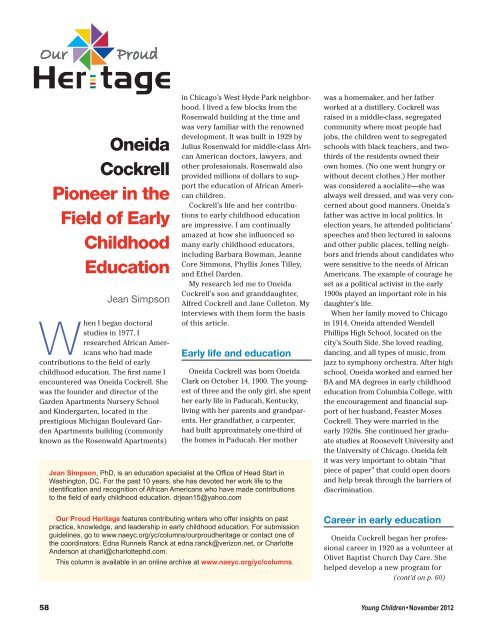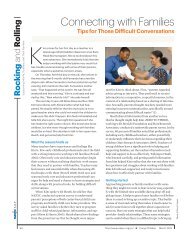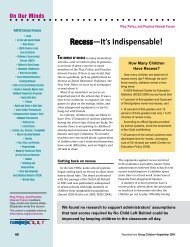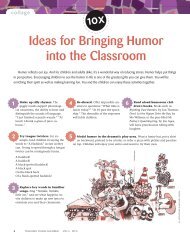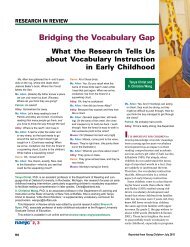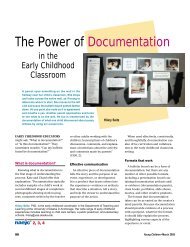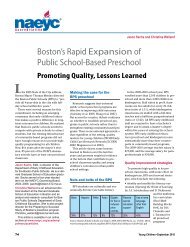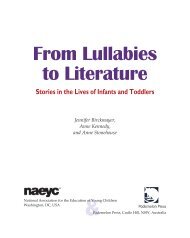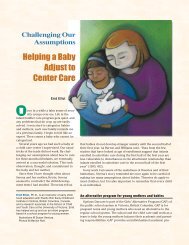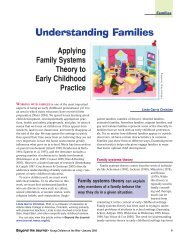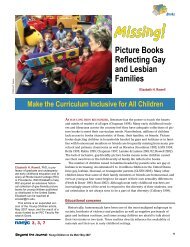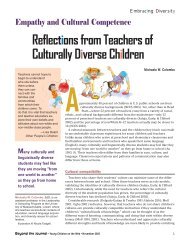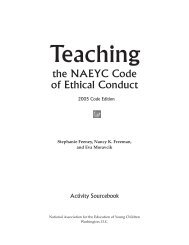Our Proud Heritage. Oneida Cockrell - National Association for the ...
Our Proud Heritage. Oneida Cockrell - National Association for the ...
Our Proud Heritage. Oneida Cockrell - National Association for the ...
You also want an ePaper? Increase the reach of your titles
YUMPU automatically turns print PDFs into web optimized ePapers that Google loves.
<strong>Our</strong> <strong>Proud</strong><br />
<strong>Our</strong> <strong>Proud</strong><br />
Her tage<br />
Charlotte Anderson and Edna Ranck<br />
in Chicago’s West Hyde Park neighborhood.<br />
I lived a few blocks from <strong>the</strong><br />
was a homemaker, and her fa<strong>the</strong>r<br />
worked at a distillery. <strong>Cockrell</strong> was<br />
Rosenwald building at <strong>the</strong> time and raised in a middle-class, segregated<br />
was very familiar with <strong>the</strong> renowned community where most people had<br />
development. It was built in 1929 by<br />
<strong>Oneida</strong> Julius Rosenwald <strong>for</strong> middle-class Afri-<br />
jobs, <strong>the</strong> children went to segregated<br />
schools with black teachers, and two-<br />
<strong>Cockrell</strong><br />
can American doctors, lawyers, and<br />
o<strong>the</strong>r professionals. Rosenwald also<br />
provided millions of dollars to supthirds<br />
of <strong>the</strong> residents owned <strong>the</strong>ir<br />
own homes. (No one went hungry or<br />
without decent clo<strong>the</strong>s.) Her mo<strong>the</strong>r<br />
port <strong>the</strong> education of African Ameri-<br />
Pioneer in <strong>the</strong> can children.<br />
was considered a socialite—she was<br />
always well dressed, and was very con-<br />
Field of Early<br />
<strong>Cockrell</strong>’s life and her contributions<br />
to early childhood education<br />
are impressive. I am continually<br />
cerned about good manners. <strong>Oneida</strong>’s<br />
fa<strong>the</strong>r was active in local politics. In<br />
election years, he attended politicians’<br />
amazed at how she influenced so<br />
Childhood many early childhood educators,<br />
speeches and <strong>the</strong>n lectured in saloons<br />
and o<strong>the</strong>r public places, telling neigh-<br />
Education<br />
including Barbara Bowman, Jeanne<br />
Core Simmons, Phyllis Jones Tilley,<br />
and E<strong>the</strong>l Darden.<br />
bors and friends about candidates who<br />
were sensitive to <strong>the</strong> needs of African<br />
Americans. The example of courage he<br />
My research led me to <strong>Oneida</strong> set as a political activist in <strong>the</strong> early<br />
Jean Simpson<br />
<strong>Cockrell</strong>’s son and granddaughter,<br />
Alfred <strong>Cockrell</strong> and Jane Colleton. My<br />
1900s played an important role in his<br />
daughter’s life.<br />
interviews with <strong>the</strong>m <strong>for</strong>m <strong>the</strong> basis When her family moved to Chicago<br />
When I began doctoral<br />
studies in 1977, I<br />
researched African Americans<br />
who had made<br />
of this article.<br />
Early life and education<br />
in 1914, <strong>Oneida</strong> attended Wendell<br />
Phillips High School, located on <strong>the</strong><br />
city’s South Side. She loved reading,<br />
dancing, and all types of music, from<br />
contributions to <strong>the</strong> field of early<br />
jazz to symphony orchestra. After high<br />
childhood education. The first name I <strong>Oneida</strong> <strong>Cockrell</strong> was born <strong>Oneida</strong> school, <strong>Oneida</strong> worked and earned her<br />
encountered was <strong>Oneida</strong> <strong>Cockrell</strong>. She Clark on October 14, 1900. The young- BA and MA degrees in early childhood<br />
was <strong>the</strong> founder and director of <strong>the</strong> est of three and <strong>the</strong> only girl, she spent education from Columbia College, with<br />
Garden Apartments Nursery School her early life in Paducah, Kentucky, <strong>the</strong> encouragement and financial sup-<br />
and Kindergarten, located in <strong>the</strong> living with her parents and grandparport of her husband, Feaster Moses<br />
prestigious Michigan Boulevard Garents. Her grandfa<strong>the</strong>r, a carpenter, <strong>Cockrell</strong>. They were married in <strong>the</strong><br />
den Apartments building (commonly had built approximately one-third of early 1920s. She continued her gradu-<br />
known as <strong>the</strong> Rosenwald Apartments) <strong>the</strong> homes in Paducah. Her mo<strong>the</strong>r ate studies at Roosevelt University and<br />
<strong>the</strong> University of Chicago. <strong>Oneida</strong> felt<br />
it was very important to obtain “that<br />
Jean Simpson, PhD, is an education specialist at <strong>the</strong> Office of Head Start in<br />
piece of paper” that could open doors<br />
Washington, DC. For <strong>the</strong> past 10 years, she has devoted her work life to <strong>the</strong><br />
and help break through <strong>the</strong> barriers of<br />
identification and recognition of African Americans who have made contributions discrimination.<br />
to <strong>the</strong> field of early childhood education. drjean15@yahoo.com<br />
Young Children • January 2009 3<br />
<strong>Our</strong> <strong>Proud</strong> <strong>Heritage</strong> features contributing writers who offer insights on past<br />
practice, knowledge, and leadership in early childhood education. For submission<br />
guidelines, go to www.naeyc.org/yc/columns/ourproudheritage or contact one of<br />
<strong>the</strong> coordinators: Edna Runnels Ranck at edna.ranck@verizon.net, or Charlotte<br />
Anderson at charli@charlottephd.com.<br />
This column is available in an online archive at www.naeyc.org/yc/columns.<br />
Career in early education<br />
<strong>Oneida</strong> <strong>Cockrell</strong> began her professional<br />
career in 1920 as a volunteer at<br />
Olivet Baptist Church Day Care. She<br />
helped develop a new program <strong>for</strong><br />
(cont’d on p. 60)<br />
58 Young Children • November 2012
young children and later became a<br />
teacher in <strong>the</strong> program. After becoming<br />
<strong>the</strong> director of <strong>the</strong> Goe<strong>the</strong> Public<br />
School Experimental Nursery School<br />
in 1928, she opened <strong>the</strong> Garden Apartments<br />
Nursery School <strong>the</strong> following<br />
year, which she would head until 1969.<br />
During those years, <strong>Oneida</strong> became<br />
known as an author, an educator, a<br />
humanitarian, and a socialite.<br />
<strong>Cockrell</strong> held many professional<br />
positions in Chicago, including consultant<br />
<strong>for</strong> New York Life Insurance. Some<br />
of her activities include planning <strong>the</strong><br />
Lake Meadows Nursery School, where<br />
she was program supervisor <strong>for</strong> three<br />
years; teaching nursery school at <strong>the</strong><br />
University of Chicago; guest lecturing<br />
at Roosevelt University and Chicago<br />
Teachers College; and serving as<br />
parent educational consultant <strong>for</strong><br />
Chicago’s Oakland Public School. She<br />
was affiliated with more than three<br />
dozen civic, religious, and educational<br />
groups, including <strong>the</strong> <strong>National</strong> <strong>Association</strong><br />
<strong>for</strong> Nursery Education (now<br />
NAEYC), where she served on <strong>the</strong><br />
Governing Board from 1952 to 1956.<br />
She worked also with <strong>the</strong> <strong>Association</strong><br />
<strong>for</strong> Childhood Education (serving<br />
a two-year term as president of <strong>the</strong><br />
Chicago chapter), <strong>the</strong> <strong>National</strong> Council<br />
of Negro Women, and <strong>the</strong> Phi Delta<br />
Kappa national teachers’ sorority. She<br />
helped establish Phi Delta Kappa and<br />
was extremely active in using <strong>the</strong> organization<br />
as a vehicle to promote early<br />
childhood education.<br />
<strong>Oneida</strong> <strong>Cockrell</strong> was very well<br />
known in <strong>the</strong> field. Her program was<br />
of such high quality that colleges,<br />
universities, and o<strong>the</strong>r organizations<br />
preparing teachers used <strong>the</strong> Garden<br />
Apartments school as a training site.<br />
<strong>Cockrell</strong> published many articles<br />
guiding parents and professionals<br />
on <strong>the</strong> development of young children.<br />
She presented <strong>the</strong> paper “The<br />
Impact of War on Children and Families”<br />
at <strong>the</strong> 1948 International Congress<br />
on Mental Health in London.<br />
In <strong>the</strong> 1950s, she wrote <strong>the</strong> column<br />
“Chats with Parents” <strong>for</strong> <strong>the</strong> Chicago<br />
Defender newspaper. President Harry<br />
Jeanne Core Simmons<br />
Remembers <strong>Oneida</strong> <strong>Cockrell</strong> and<br />
Her Innovative Ideas<br />
“There were not many books on <strong>the</strong> learning abilities of Black children when<br />
I entered <strong>the</strong> field in 1948, but <strong>Oneida</strong> <strong>Cockrell</strong> had some innovative ideas<br />
about children’s learning abilities. Part of our program at <strong>the</strong> Rosenwald<br />
Nursery was in conjunction with <strong>the</strong> University of Chicago, and we did mainstreaming<br />
back in 1954. She also felt that self-identity <strong>for</strong> Black children was<br />
important, so she searched <strong>for</strong> a company that made Black dolls. It took<br />
a long time to find <strong>the</strong> company, but when she did, our children were able<br />
to play with Black and white dolls. This was important because we had an<br />
integrated enrollment. I don’t even recall any <strong>the</strong>ories about <strong>the</strong> learning abilities<br />
of Black children being taught. All <strong>the</strong>ory I learned referred to children, in<br />
general. But at <strong>the</strong> Rosenwald Nursery, we believed that <strong>the</strong> learning abilities<br />
of Black children were <strong>the</strong> same as those of white children. All children were<br />
introduced to <strong>the</strong> same concepts. Having an appreciation of family and community<br />
differences is one of <strong>the</strong> unique curriculum experiences that go into an<br />
early childhood education program <strong>for</strong> Black children” (Simpson 1981, 201).<br />
Truman, acknowledging <strong>Oneida</strong>’s<br />
expertise, invited her to participate<br />
in <strong>the</strong> 1950 Mid-Century White House<br />
Conference on Children and Youth.<br />
Recognition and awards<br />
<strong>Cockrell</strong> received many awards,<br />
honors, and recognitions. In 1964,<br />
<strong>the</strong> <strong>Association</strong> <strong>for</strong> Nursery Schools<br />
awarded her its first Life Membership<br />
Honorarium. More than 200<br />
people ga<strong>the</strong>red to honor <strong>Oneida</strong> <strong>for</strong><br />
her contributions to <strong>the</strong> field of early<br />
childhood education. Maria Piers,<br />
cofounder of <strong>the</strong> Erikson Institute, was<br />
<strong>the</strong> principal speaker.<br />
<strong>Oneida</strong> demonstrated a great humanitarian<br />
spirit and <strong>for</strong>esight throughout<br />
her career. As director of <strong>the</strong> Garden<br />
Apartments Nursery School, she<br />
enrolled children with special needs<br />
and worked with <strong>the</strong>m individually,<br />
showing respect <strong>for</strong> all young children.<br />
She kept families in<strong>for</strong>med of children’s<br />
learning styles through <strong>the</strong> Nursery<br />
Newsletter. In 1960, Chicago hosted <strong>the</strong><br />
American Psychological <strong>Association</strong><br />
convention, and <strong>Cockrell</strong> and <strong>the</strong> nursery<br />
school’s teacher, Jeanne Core Simmons,<br />
provided a child care program<br />
<strong>for</strong> APA members’ children.<br />
<strong>Oneida</strong> <strong>Cockrell</strong>’s legacy<br />
<strong>Oneida</strong> worked in early childhood<br />
education <strong>for</strong> 49 years, from 1920 to<br />
1969. She is a pioneer whom all early<br />
childhood educators should know<br />
about. She had many successes, but<br />
her greatest triumph was teaching<br />
and guiding young children through<br />
<strong>the</strong>ir early, <strong>for</strong>mative years. One of <strong>the</strong><br />
children whose lives she touched is<br />
Barbara Taylor Bowman, a nationally<br />
known early childhood educator from<br />
Chicago. Bowman lived in <strong>the</strong> Rosenwald<br />
apartments and attended <strong>the</strong><br />
Garden Apartments Nursery School.<br />
While in graduate school, Bowman<br />
60 Young Children • November 2012
worked as an assistant teacher at<br />
<strong>the</strong> preschool. She later became a<br />
cofounder and president of <strong>the</strong> Erikson<br />
Institute, is a past-president of NAEYC,<br />
and is still influencing <strong>the</strong> field today.<br />
E<strong>the</strong>l Darden, in an interview with The<br />
HistoryMakers website, explained that<br />
<strong>the</strong> Howalton Day School (1947–1986)<br />
“was Chicago’s oldest African American,<br />
private, nonsectarian school” and<br />
“was an outgrowth of <strong>Cockrell</strong>’s pioneering<br />
preschool and kindergarten”<br />
ef<strong>for</strong>ts. The <strong>Oneida</strong> <strong>Cockrell</strong> Child Parent<br />
Center (now <strong>the</strong> Ross-<strong>Cockrell</strong> CPC<br />
Elementary School), built in 1975, is<br />
located at 61st and Wabash in Chicago,<br />
serving 100 preschool and kindergarten<br />
children.<br />
References<br />
Darden, E. 2004. The HistoryMakers website.<br />
Interview conducted June 1. www.<strong>the</strong>historymakers.com/biography/e<strong>the</strong>l-darden-38.<br />
NEW FROM NAEYC!<br />
What Early Childhood Educators Can<br />
Learn from <strong>Oneida</strong> <strong>Cockrell</strong><br />
• African Americans made significant contributions to <strong>the</strong> beginning of <strong>the</strong> early<br />
education field.<br />
• It is important <strong>for</strong> teachers to treat all children with respect, regardless of <strong>the</strong>ir<br />
physical or mental challenges.<br />
• The history of early education includes much more than what is written in<br />
textbooks.<br />
• Searching <strong>for</strong> and recognizing contributions of o<strong>the</strong>rs in <strong>the</strong> field is a rewarding<br />
endeavor.<br />
• Children’s cultures should be reflected in <strong>the</strong> classroom materials, including<br />
dolls.<br />
Johnson Publishing. 1970. “Census. Died.<br />
<strong>Oneida</strong> <strong>Cockrell</strong>.” Jet. October 29: 46. http://<br />
books.google.com/books?id=jzcDAAAAMBAJ<br />
&printsec=frontcover&source=gbs_ge_<br />
summary_r&cad=0#v=onepage&q&f=false.<br />
Simpson, W.J. “A Biographical Study of Black<br />
Educators in Early Childhood Education.”<br />
PhD diss., Fielding Institute (Santa Barbara,<br />
CA), 1981.<br />
Copyright © 2012 by <strong>the</strong> <strong>National</strong> <strong>Association</strong> <strong>for</strong> <strong>the</strong> Education<br />
of Young Children. See Permissions and Reprints<br />
online at www.naeyc.org/yc/permissions.<br />
Education <strong>for</strong> a Civil Society:<br />
How Guidance Teaches Young Children<br />
Democratic Life Skills<br />
Dan Gartrell<br />
It is essential that children gain, through teacher guidance, democratic life skills, which<br />
are <strong>the</strong> social-emotional skills <strong>the</strong>y need to succeed in and participate civilly in modern<br />
life. Part I establishes historical roots <strong>for</strong> <strong>the</strong> type of education that prepares children <strong>for</strong><br />
this participation. Part 2 makes <strong>the</strong> case that best practices in early childhood education<br />
offer <strong>the</strong> approach to education <strong>for</strong> democracy that society needs. Part 3 provides an<br />
overview of <strong>the</strong> five democratic life skills, and includes anecdotes that illustrate how<br />
guidance fosters <strong>the</strong> development of <strong>the</strong>se important life skills.<br />
ISBN: 9781928896876 • Item #356<br />
$35.00 • Member: $28.00 20% savings<br />
Order online at www.naeyc.org/store<br />
or call 800-424-2460 option 5 (9:00 a.m. – 5:00 p.m. EST, Monday – Friday)<br />
Young Children • November 2012 61


